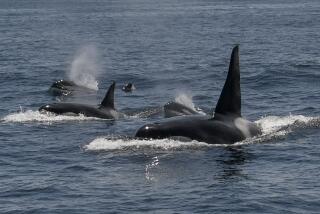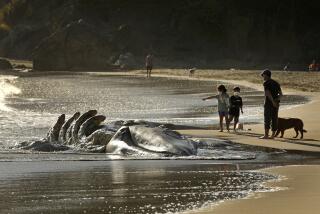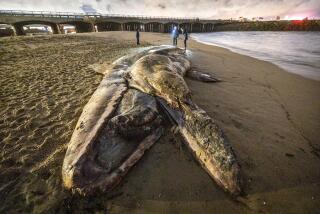Lost whales move to safer Everglades waters; deaths rise to 11
Another whale trapped in shallow waters in Everglades National Park was found dead Thursday, but the survivors in the pod continued to swim into deeper waters, increasing their chances of survival.
On Thursday, one more pilot whale was found dead and another five were not seen and may have died, said Blair Mase of the National Oceanic and Atmospheric Administration in a conference call with reporters.
The rescue team was surprised Thursday to find that the whales had left the original spot where they were stranded. The U.S. Coast Guard spotted 35 of them nine miles north, in water that was about 12 feet deep, Mase said. Over the course of the day, the rescue team worked to keep the whales from returning to the shore, raising their chances of survival.
Mase voiced cautious optimism that the whales might be able to find their way out of the remote and shallow Everglades waters.
On Wednesday, they were trapped in water just a few feet deep, and herding efforts failed in part because the 20-mile journey to deeper waters required swimming through shallow water crisscrossed by sand bars.
“We are encouraged and hopeful, but there’s no guarantee they will continue to move offshore,” Mase said.
She said if they do continue swimming offshore, there are no physical barriers that would prevent them from reaching deeper waters. The whales typically live in water 1,000 feet deep.
Because pilot whales display herd behavior, they resist being guided away from their fellow whales. Short-finned pilot whales typically travel in groups of 25 to 50, according to the NOAA fisheries website.
The dead whales will be tested for disease seeking clues as to why they stranded.
The pilot whale is the most common species that mass strands in Florida, Mase said. Twenty-two were stranded in 2012, and 23 in 2011.
Twitter: @skarlamangla
soumya.karlamangla@latimes.com
More to Read
Start your day right
Sign up for Essential California for news, features and recommendations from the L.A. Times and beyond in your inbox six days a week.
You may occasionally receive promotional content from the Los Angeles Times.







